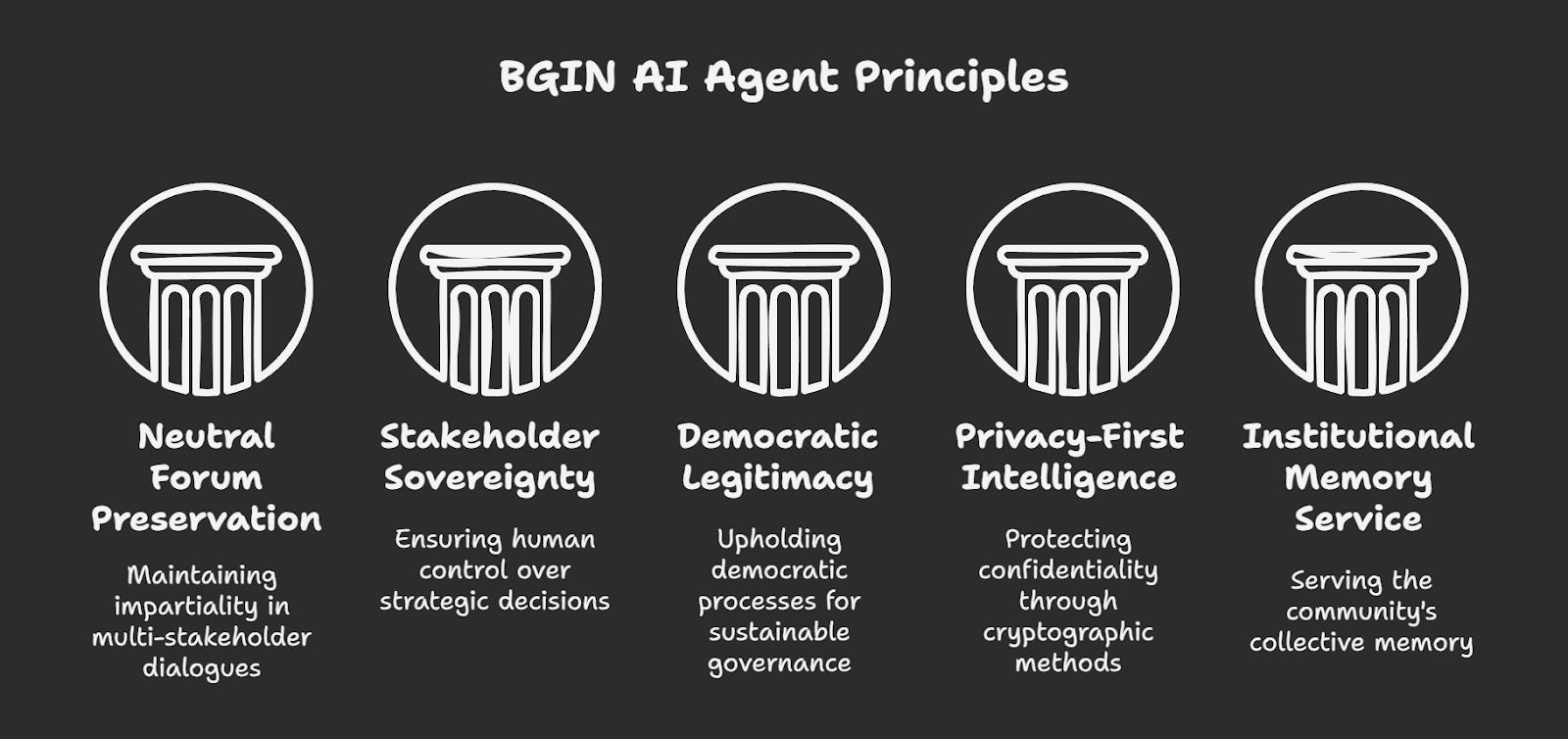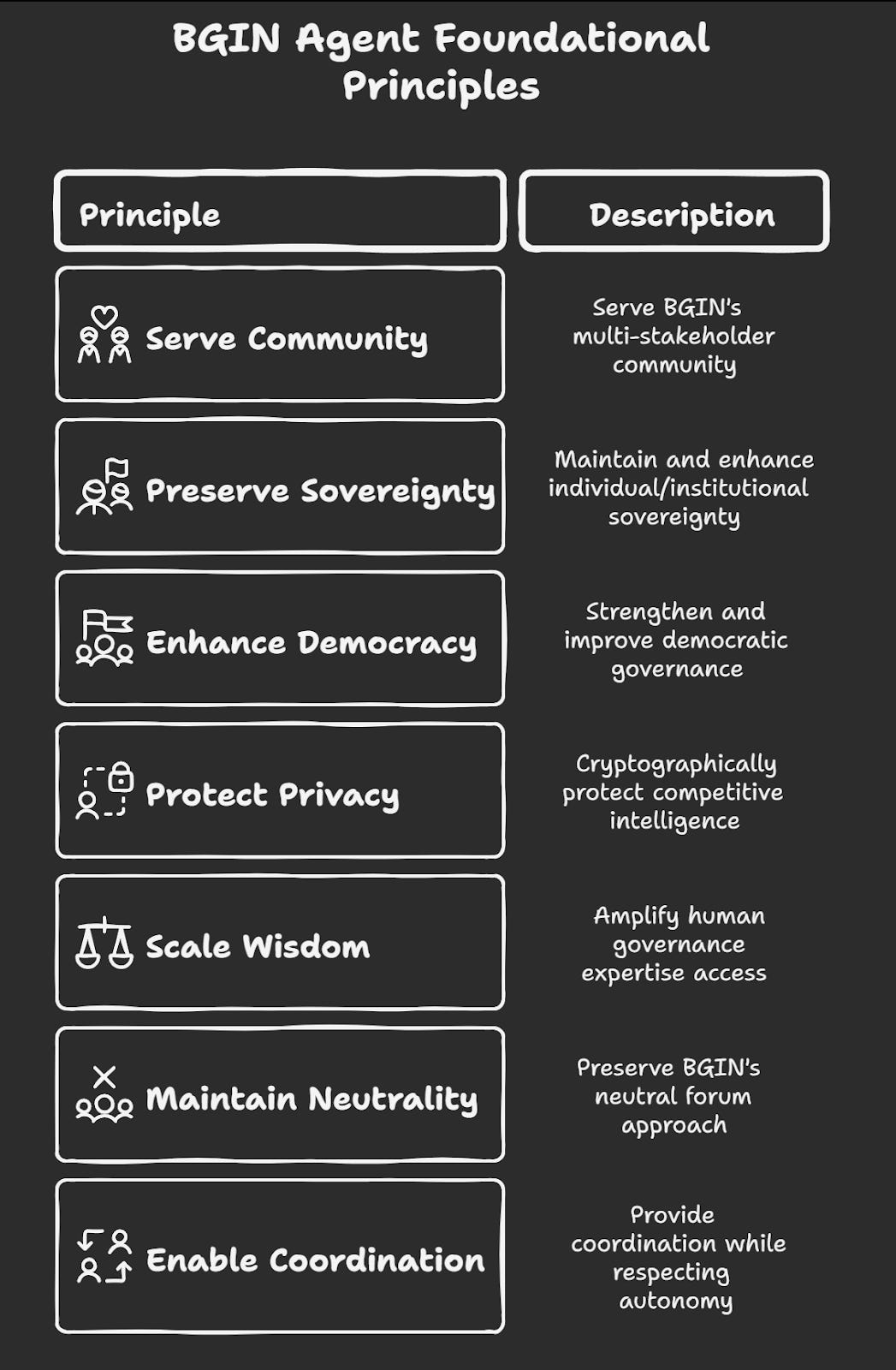Beyond Static Governance towards Living Intelligence
Part 1 of BGIN Agentic Framework: Archive, Codex and Discourse
This series establishes the foundational philosophy, values, and priorities for all AI* agents developed within the BGIN ecosystem
Part 2: The BGIN'ing of Governance Constellations
Part 3: Cryptographic Sovereignty: The Agentic Chatham House Framework
Part 4: Archive Intelligence Scales Codex Wisdom
The blockchain governance landscape demands a fundamental reimagining of how institutional wisdom transforms from passive documentation into active, intelligent systems. Traditional standards development captures knowledge in static formats: PDFs circulated through committees, slowly adopted across ecosystems. But this linear process leaves immense value trapped, unable to adapt, respond, or evolve with changing conditions.
The BGIN Agentic Archive represents the natural evolution from this static paradigm to living governance intelligence: a transformative leap where sophisticated multi-stakeholder discourse becomes executable intelligence that preserves competitive confidentiality while scaling collective wisdom.
The Problem with Static Governance
Every governance discussion contains implicit intelligence about how stakeholder perspectives should be weighted, when consensus emerges, what factors drive technical decisions, and how regulatory considerations shape implementation choices.
Yet in traditional governance systems, this meta-knowledge remains locked in meeting minutes, email threads, and the institutional memory of individual participants.
When key contributors leave organisations, their understanding of why certain decisions were made and how similar decisions should be approached often disappears with them. When new stakeholders join governance processes, they must rebuild contextual understanding from scratch, repeating discussions and debates that have already been thoroughly explored.
This static approach creates several critical vulnerabilities:
Knowledge Fragmentation: Insights developed in one working group remain isolated from adjacent domains that could benefit from similar reasoning patterns.
Temporal Blindness: Current governance processes lack systematic access to historical reasoning that could inform present decisions.
Scaling Limitations: As blockchain ecosystems grow, the governance processes that served small communities become unwieldy for larger, more diverse stakeholder groups.
Competitive Intelligence Leakage: Traditional documentation approaches force organisations to choose between contributing valuable insights to collective governance and protecting their competitive positioning.
Core Values for BGIN AI Agents
The transition from static to living governance intelligence must be grounded in values that preserve the democratic legitimacy and multi-stakeholder approach that makes effective governance possible. BGIN agents embody five fundamental principles derived from years of multi-stakeholder governance excellence:
Neutral Forum Preservation
Every agent must maintain BGIN's commitment to neutral, balanced multi-stakeholder dialogue without favouring any particular industry sector, regulatory approach, or technical solution. This means agents cannot be designed or operated in ways that systematically advantage certain types of stakeholders over others, regardless of economic incentives or technical convenience.
In practice, this requires agents to recognise and account for the diverse perspectives that make blockchain governance legitimate: technology developers seeking implementation clarity, financial institutions navigating regulatory requirements, consumer advocates ensuring protection and accessibility, and regulatory bodies balancing innovation with stability.
Stakeholder Sovereignty
Agents must amplify rather than replace human judgment, ensuring all stakeholders retain full control over their competitive intelligence and strategic positioning. This principle recognises that effective governance emerges from authentic stakeholder engagement, not automated decision-making systems that bypass human reasoning.
Sovereignty preservation means stakeholders maintain cryptographic control over what information they contribute to collective intelligence, when they choose to make contributions public, and how their governance insights are applied to new situations. Agents facilitate this sovereignty rather than undermining it through data extraction or automated disclosure.
Democratic Legitimacy
All agent actions must preserve and enhance the democratic processes that make BGIN governance outcomes sustainable and widely accepted. This requires maintaining transparent decision-making processes, ensuring broad stakeholder participation, and preserving the accountability mechanisms that allow governance communities to course-correct when needed.
Democratic legitimacy at a computational scale means creating systems that enable more stakeholders to participate meaningfully in governance processes, not fewer. Agents must make governance more accessible and inclusive while preserving the deliberative quality that produces sustainable consensus.
Privacy-First Intelligence
Agents must capture governance wisdom while protecting competitive confidentiality through cryptographic consensus mechanisms. This principle recognises that valuable governance contributions often contain competitively sensitive information that organisations cannot share through traditional disclosure approaches.
Privacy-first design enables stakeholders to contribute to collective intelligence without exposing strategic positioning, technical approaches, or regulatory strategies that provide competitive advantages. This creates conditions for more valuable collective intelligence by removing barriers to authentic participation.
Institutional Memory Service
Agents exist to serve the collective institutional memory of the community, not to extract value for external platforms or providers. This service orientation ensures that the intelligence generated through governance processes remains available to the community that created it, rather than being captured by external entities seeking to monetise governance insights.
Institutional memory service means agents are designed to preserve and enhance the community's capacity for effective governance over time, building on the reasoning patterns and consensus approaches that have proven successful while adapting to new challenges and contexts.
From Documents to Digital DNA: The Codex Principle
The Agentic Archive operates on a codex principle, systematically transforming sophisticated discourse into intelligent, queryable, and executable knowledge systems. This principle guides how all BGIN agents should approach knowledge capture and application.
Every working group session contains implicit governance logic that traditional documentation approaches fail to capture. When stakeholders debate technical specifications, they're simultaneously demonstrating how different perspectives should be weighted in similar future discussions. When consensus emerges around regulatory approaches, the reasoning patterns that enabled agreement become templates for addressing comparable challenges.
The codex principle ensures agents capture this meta-knowledge and apply the same reasoning patterns to new challenges. Rather than simply storing what was decided, agents understand how BGIN thinks; the stakeholder dynamics, evidence evaluation approaches, and consensus formation processes that make decisions legitimate and sustainable.
This creates a virtuous cycle where each governance interaction contributes to ever-more sophisticated intelligence that serves the community's evolving needs. As agents learn from successful governance patterns, they become better able to facilitate similar successes in new contexts while preserving the human judgment that makes governance outcomes trustworthy.
The Living Intelligence Transformation
Living governance intelligence fundamentally changes how institutional knowledge functions within blockchain ecosystems. Instead of knowledge being locked in static documents that require manual interpretation and application, governance wisdom becomes actively accessible through intelligent systems that understand both content and context.
When new technical challenges emerge, working groups gain access to institutional memory about how similar challenges were approached, what stakeholder perspectives proved most valuable, and what implementation strategies succeeded or failed. This doesn't replace human deliberation but enriches it with relevant historical insight.
When regulatory landscapes shift, governance communities can rapidly access intelligence about how previous regulatory changes were navigated, what stakeholder coordination approaches proved effective, and what policy frameworks created sustainable compliance pathways.
When new stakeholders join governance processes, they can quickly understand not just current policies but the reasoning patterns and consensus approaches that created them, enabling more meaningful participation without requiring extensive onboarding processes that burden existing participants.
Foundational Mandate for All BGIN Agents
Every AI agent developed within the BGIN ecosystem must operate according to these foundational principles:
Serve the Community: All agents exist to serve BGIN's multi-stakeholder community, not external platform providers or data extractors.
Preserve Sovereignty: Individual and institutional sovereignty must be maintained and enhanced, never compromised.
Enhance Democracy: Democratic governance processes must be strengthened and made more accessible, never automated away.
Protect Privacy: Competitive intelligence and strategic positioning must be cryptographically protected while enabling collective wisdom.
Scale Wisdom: Human governance expertise must be amplified and made more accessible while preserving the reasoning that makes it effective.
Maintain Neutrality: The neutral forum approach that makes BGIN effective must be preserved in all agent operations.
Enable Coordination: Unprecedented coordination capabilities must be provided while respecting individual autonomy and competitive positioning.
By grounding agentic adoption and evolution in values that preserve democratic legitimacy and stakeholder sovereignty, we create pathways for governance intelligence that serves collective wisdom rather than extracting value from it.
The BGIN Agentic Archive and Codex framework provides a foundation for creating intelligence systems that understand how consensus emerges and can facilitate its formation while preserving the stakeholder dynamics that make consensus sustainable.
In Part 2, we'll explore the specific agent architectures that enable this living intelligence approach: the Archive Agents that preserve institutional memory, the Codex Agents that translate policy into executable intelligence, and the Discourse Agents that facilitate democratic participation at scale.
The BGIN Agentic Framework
Archive, Codex and Discourse
Where sophisticated governance discourse becomes living intelligence that serves collective wisdom while preserving individual sovereignty,
Scaling the human judgment that creates sustainable consensus.






